Unit 8 - 厦门大学外文学院
英语人教版八年级下册Unit 8单元复习课.一师一优课-孙小婉-人教版八下Unit 8 复习课课件

Body
Feelings
1. I feel ________ when I listen to his/her songs.
Ending
Writing
小组分工合作写一篇文章。 S1 name S2 country S3 music S4 records S5 feelings S6 good sentences(好句) (一句好句加3分)
Little Wowen
Oliver Twist
Alice in Wonderland
Tom Sawyer
Treasure Island
Robinson Crusoe
Activity 2
If you are unhappy, music will make you happy; and if you are happy, music will make you happier.
Activity 3
Read and complete the chart.
Jay Chou China Pop music More than 5 million records Happy and full of energy
Activity 4
Survey:my favorite singer
闽教版小学英语五下Unit8Datesofthe

06 Summary and Review
The key content of this unit
Months of the year
learning to identify and name the 12 months in the English calendar.
Dates and days
Min Education Press Primary School English Unit 8 dates of the month
目录
• introduction • Overview of Unit Content • Date expression • practical application • Practice and consolidation • Summary and Review
reading comprehension
Reading comprehension on the calendar
Provide a short passage about the calendar, focusing on key information such as the names and order of the months, or the number of days in each month.
Vocabulary learning
月份词汇
学生将学习并掌握一年中 各个月份的英文表达,如 January、February、 March等。
星期词汇
学生将学习一周内每一天 的英文表达,如Monday、 Tuesday、Wednesday等。
日期表达
学生将学习如何使用英文 表达具体的日期,如 "Today is the 15th of June."
闽教版五年级下册Unit8TheUniverseLesson15教学设计
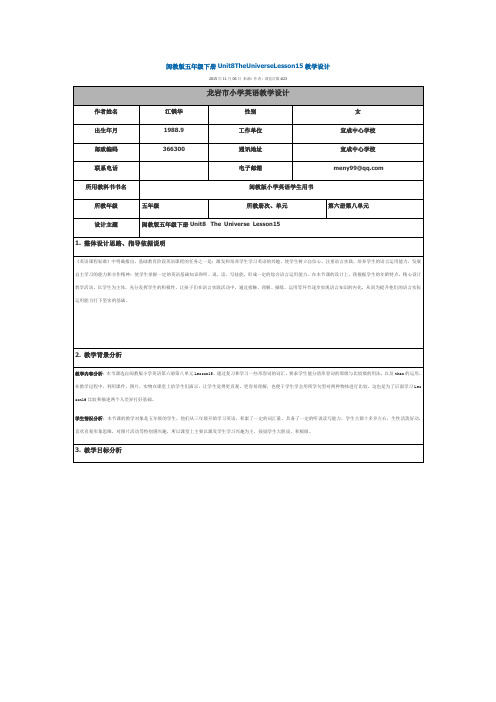
闽教版五年级下册Unit8TheUniverseLesson15教学设计2015年11月06日来源: 作者: 浏览次数:623师生互致问候。
T: Hello, boys and girls. Nice to meet you! Ss: Nice to meet you, too.T:My name is ….What’s your name? S1: My name is XXX.T: What’s your favorite sport? S1: My f avorite sport is …..T: What do you want to be ? S1:I want to be….……..设计意图:通过与学生自由谈话,拉近了师生间的距离。
同时也巩固了前面所学的知识,充分调动学生脑海中的知识储备,提高学生英语口语水平。
二、复习导入(1)复习形容词。
教师出示图片, 复习 big, small, old, long形容词,并引导学生注意这四个形容词的音、形、义。
For example(出示课件)T; What’s this?Ss: It’s a basketball.T: What’s this?Ss: It’s a ping-pong.T: The basketball is ?(做动作). Ss: The basketball is big.T: And the ping-pong is ? (做动作)Ss: The ping-pong is small.(板书big-small)……同法,教师出示慢羊羊与懒洋洋的图片,由old引出反义词young,(板书并教学young )并让学生边读边做动作;接着教师拿出两根长度不一的铅笔,由long引出反义词sho rt(板并教学short)。
(2)活动——唱反调(出示PPT)教师伴随着音乐拍掌(拍掌两下说I say,桌上拍两下说big)说I say big, 学生跟着拍掌说I say small, 教师拍掌说big, 学生拍掌说small; 教师拍掌说:I say young,学生拍掌说I say old,教师拍掌说young, 学生拍掌说old. (背景音乐为we will rock you.)(3)板书课题—Unit 8 Lesson15。
厦门大学外文学院2018年硕士研究生复试录取工作细则

八、复试录取工作日程安排(具体查看《2018 年外文学院硕士研究生复
试安排表》) 1.复试期间,考生进行体检(体检需空腹,体检表至少需半个工作日才能取,
学院(研究院)的复试录取工作领导小组由各学院(研究院)院长、书记和 分管研究生教育的副院长、副书记、学院(研究院)负责纪检工作的院领导以及 院系相关领导组成。由院长任组长,分管研究生教育的副院长任副组长。复试录 取工作领导小组负责组织成立若干复试小组。复试小组具体实施对每位考生的复 试考核。每个复试小组应由不少于 5 名办事公正和责任心强的教师(研究生导 师一般不少于 3 人)组成,并设立组长一名。
(3)对同等学力考生,除统一规定的复试内容之外,还需加试两门专业课。 加试科目为所报考专业的两门本科主干课程,且不得与初试科目相同。加试的方 式为笔试。考试时间为每门 3 小时,每门课程满分为 100 分。加试的两门主干课 程不计入总成绩,但任何一门加试科目成绩达不到 60 分者,视为整个复试不及 格。
为了加强复试录取的巡视和监督工作,各学院(研究院)须成立复试录取工 作巡视督查小组,由院系相关领导组成。复试录取工作巡视督查小组由党委书记 任组长,负责纪检工作的院领导(或指定其他院领导)任副组长,负责全程巡视 监督本院内的复试录取工作。
各学院(研究院)应在规定的时间内将复试录取工作领导小组和复试巡视督 查小组成员名单通过规定的格式上报。
三、严格培训
学院在复试录取工作开始前召开培训会,对参与复试录取工作的全体教师和 工作人员进行政策、业务、纪律等方面的培训,使其明确工作纪律和工作程序、 评判规则和评判标准;要强化参与工作教师的公平意识、责任意识、业务意识和 保密意识。参与命题、制卷和面试等复试工作的涉密教师和工作人员须与学院签 订保密承诺书;学院院长和分管研究生教育的副院长须与学校签订招生考试安全 责任书。
厦大英文面试题目(3篇)

第1篇IntroductionThe University of Xiamen, located in the coastal city of Xiamen, Fujian Province, China, is renowned for its beautiful campus, strong academic reputation, and vibrant student life. As a leading institution in China, the University of Xiamen attracts a large number of international students every year. To ensure that these students are well-prepared for their studies and life in China, the university conducts a series of interviews to assess their language proficiency, academic background, and personal suitability for the program. Below is a comprehensive list of potential interview questions that may be asked during the interview process.Section 1: Personal Information and Background1. Can you introduce yourself in English?2. Where are you from and what is your nationality?3. Why did you choose to study at the University of Xiamen?4. Can you tell us about your family background?5. What are your hobbies and interests outside of academics?6. How do you spend your free time?7. Have you ever traveled abroad? If yes, where and what did you enjoy about it?8. What do you think are the main differences between your culture and Chinese culture?9. How do you plan to adapt to a new culture and environment?Section 2: Academic Background and Goals10. What is your major and why did you choose it?11. Can you describe your academic achievements in high school or previous education?12. What are your strengths and weaknesses as a student?13. How do you handle stress and pressure in your studies?14. Have you participated in any extracurricular activities or community service during your studies? If yes, what were they?15. What are your academic goals for the next few years?16. How do you plan to utilize your degree after graduation?17. Are there any specific courses or professors at the University of Xiamen that you are interested in?18. What are your expectations for the academic environment at the University of Xiamen?Section 3: Language Proficiency19. How long have you been studying English?20. What is your proficiency level in English, according to the Common European Framework of Reference for Languages (CEFR)?21. Can you describe a challenging situation where you had to use English and how you dealt with it?22. How do you improve your English language skills?23. Do you have any experience in English-speaking environments or cultures?24. How would you rate your listening, speaking, reading, and writing skills in English?25. What are your strategies for overcoming language barriers?Section 4: Motivation and Reasons for Applying26. Why do you want to study in China?27. What do you think are the advantages and disadvantages of studyingin a different country?28. How do you plan to contribute to the diversity of the University of Xiamen?29. Can you describe a time when you had to work in a team with people from different backgrounds?30. What are your expectations for the university's cultural exchange programs?31. How do you plan to engage with Chinese students and the local community?32. What are your long-term career aspirations and how does studying at the University of Xiamen align with them?33. Why do you think you are a good fit for the University of Xiamen?Section 5: Challenges and Adaptation34. What challenges do you anticipate facing while studying in China and how do you plan to overcome them?35. How do you deal with homesickness or feelings of isolation?36. What are your expectations regarding the university's support for international students?37. How do you plan to balance your academic responsibilities with personal life and social activities?38. Can you describe a situation where you had to adjust to a new environment and what you learned from it?39. How do you maintain a healthy lifestyle while studying abroad?40. What are your thoughts on the importance of cross-cultural communication and collaboration?Section 6: Additional Questions41. Do you have any questions for us?42. Can you provide any additional information about your application or personal experiences?43. What do you think is the most important skill for a successful student?44. How do you prioritize your tasks and manage your time effectively?45. Can you describe a leadership experience you have had and what you learned from it?46. What are your thoughts on the role of technology in education?47. How do you plan to stay connected with your family and friends back home?48. What are your expectations for the Chinese education system?49. How do you think studying at the University of Xiamen will benefit your future career?50. What advice would you give to a prospective international student considering studying in China?This comprehensive list of interview questions is designed to provide a framework for the University of Xiamen's interview process. While the actual questions may vary, these questions will help candidates prepare for the interview and demonstrate their suitability for the program. Good luck with your application!第2篇IntroductionXiamen University, located in the beautiful coastal city of Xiamen, China, is renowned for its academic excellence and vibrant campus life. As part of the admission process for international students, a comprehensive English interview is conducted to assess the candidate's language proficiency and suitability for the program. Below is acomprehensive list of potential interview questions that may be asked during the English interview at Xiamen University.Section 1: Introduction and Background1. Can you tell us a little about yourself?2. Why did you choose to apply to Xiamen University?3. What are your academic interests?4. Can you describe your educational background?5. What are some of the most significant challenges you have faced in your academic journey?6. How do you think your previous experiences have prepared you for studying at Xiamen University?7. What are your long-term career goals?8. How do you plan to contribute to the academic community at Xiamen University?9. Can you share any extracurricular activities or hobbies you are involved in?10. What do you like to do in your free time?Section 2: Language Proficiency11. Why do you think English is important in today's globalized world?12. Can you describe a situation where you had to use English in a real-life context?13. How would you describe your level of English proficiency?14. What are your strengths and weaknesses in English?15. Can you tell us about a book or movie that you recently watched or read in English?16. How do you approach learning a new language?17. What are some challenges you have faced while learning English?18. How do you stay motivated to improve your English skills?19. Can you explain the difference between formal and informal English?20. What are some common English idioms or phrases that you use frequently?Section 3: Academic and Professional Skills21. What research projects or papers have you worked on?22. How do you approach problem-solving in your academic work?23. Can you describe a time when you had to work as part of a team?24. What are your strengths and weaknesses in team projects?25. How do you handle stress or pressure in academic or professional settings?26. What are some strategies you use to manage your time effectively?27. Can you explain a complex concept or theory in your field using simple English?28. How do you stay updated with the latest developments in your field?29. What are your thoughts on the importance of lifelong learning?30. How do you approach writing academic papers or reports?Section 4: Cultural Awareness and Adaptability31. How would you describe your cultural background?32. Can you share an experience where you had to adapt to a new culture?33. What are your thoughts on cultural diversity?34. How do you think cultural differences can impact communication?35. What are some challenges you might face as an international student in China?36. How do you plan to overcome these challenges?37. Can you tell us about a time when you had to work with someone froma different cultural background?38. How do you approach cultural misunderstandings or conflicts?39. What are your thoughts on cross-cultural collaboration?40. How do you think your cultural background will contribute to your studies at Xiamen University?Section 5: Specific Program-related Questions41. Can you tell us about your chosen major or program?42. What do you hope to learn from this program?43. How do you plan to apply what you learn in your future career?44. What are some of the most interesting courses you have taken or would like to take?45. How do you think your program of study will help you achieve your career goals?46. What are some of the key skills you hope to develop during your time at Xiamen University?47. How do you plan to engage with the faculty and staff at Xiamen University?48. What are your expectations of the academic environment at Xiamen University?49. How do you plan to integrate into the student community at Xiamen University?50. Can you tell us about any specific clubs or organizations you are interested in joining?ConclusionThe English interview at Xiamen University is designed to assess a candidate's overall language proficiency, academic abilities, cultural awareness, and adaptability. By thoroughly preparing for the questions outlined above, candidates can demonstrate their suitability for the program and their enthusiasm for studying at Xiamen University. Good luck!---Note: The above questions are meant to provide a comprehensive guide for candidates preparing for the English interview at Xiamen University. The actual interview may include additional questions or focus on different aspects of the candidate's background and skills.第3篇IntroductionXiamen University, located in the scenic coastal city of Xiamen, China, is renowned for its beautiful campus and strong academic programs. As a prestigious institution, Xiamen University attracts candidates from all over the world. To ensure that candidates possess a high level of English proficiency, the university has developed a comprehensive interview process. Below are a variety of English interview questions that candidates might encounter during their interview at Xiamen University.Section 1: Introduction and Background1. Can you tell us a little about yourself?2. Where are you from, and what do you enjoy most about your home country?3. What motivated you to apply to Xiamen University?4. Can you describe your educational background and any notable achievements?5. How did you prepare for this interview?6. What do you know about Xiamen University and its programs?7. Why do you think you would be a good fit for your chosen program?8. Can you tell us about a challenging experience you have overcome?9. How do you handle stress or pressure in your personal or academic life?10. What are your long-term career goals, and how does Xiamen University fit into your plan?Section 2: Language Proficiency11. What is your native language, and how long have you been learning English?12. Can you describe a situation where you had to use English in a professional or academic setting?13. How would you describe your level of English proficiency (e.g., reading, writing, speaking, listening)?14. What are your strengths and weaknesses in English?15. Can you give an example of a book, movie, or TV show you have recently watched or read, and how it affected you?16. How do you stay updated with current events or news in English?17. Can you summarize a recent article or news report in English?18. What is your favorite English language song or poem, and why?19. How do you feel about using English in an academic environment?20. Can you describe a time when you had to use English to communicate with someone who spoke a different language?Section 3: Critical Thinking and Problem-Solving21. Describe a complex problem you have faced and how you solved it.22. What are your views on the importance of critical thinking in your field of study?23. How do you approach research, and what sources do you use to gather information?24. Can you give an example of a time when you had to work under a tight deadline?25. What is your approach to decision-making, and how do you weigh different options?26. How do you handle conflicts or disagreements with peers or colleagues?27. Can you explain a concept or theory that is relevant to your field of study?28. What are some emerging trends in your field, and how do you think they will impact the future?29. How do you stay informed about new developments in your field?30. Can you discuss the ethical implications of your chosen field?Section 4: Communication and Interpersonal Skills31. Describe a situation where you had to communicate a difficult message to someone.32. How do you handle feedback or criticism, both positive and negative?33. What are your strengths in team projects or group work?34. Can you give an example of a time when you had to work with someone who had a different working style?35. How do you build rapport and maintain relationships with colleagues or clients?36. What is your approach to public speaking or presentations?37. How do you handle stress or nervousness during a presentation?38. Can you describe a successful collaboration you have been a part of?39. What are your communication preferences (e.g., in-person, email, phone)?40. How do you ensure effective communication in a diverse team?Section 5: Adaptability and Cultural Awareness41. Describe a time when you had to adapt to a new environment or culture.42. How do you handle cultural differences or misunderstandings in a professional setting?43. What are your views on globalization, and how does it affect your field of study?44. Can you give an example of a cultural practice or tradition that you find interesting or unique?45. How do you incorporate cultural diversity into your work or projects?46. What are your experiences with living or studying in a different country?47. How do you maintain a balance between your personal and professional life, especially when dealing with cultural differences?48. What are your views on multiculturalism and its benefits?49. Can you discuss a global issue that is relevant to your field of study?50. How do you think your cultural background has influenced your approach to learning and problem-solving?ConclusionThese interview questions are designed to assess a candidate's English proficiency, critical thinking, problem-solving skills, communication abilities, and cultural awareness. The questions aim to provide acomprehensive understanding of the candidate's suitability for Xiamen University and its programs. Candidates should prepare thoroughly for their interview, ensuring they can confidently answer these questions and demonstrate their qualifications for the chosen program. Good luck!。
厦门大学基础英语教材

厦门大学基础英语教材Introduction:The Basic English textbook at Xiamen University is designed to provide fundamental language skills and knowledge to students. Developed by experienced educators, the textbook aims to enhance students' English proficiency in listening, speaking, reading, and writing. This article will explore the content of the textbook and its effectiveness in helping students achieve their language learning goals.Unit 1: Introduction to Basic EnglishThe first unit of the textbook introduces the concept of Basic English and its importance in global communication. Students learn greetings, introductions, and basic conversational phrases. Simple grammar rules and sentence structures are also covered, enabling students to construct basic sentences.Unit 2: Vocabulary BuildingVocabulary plays a crucial role in language learning. This unit focuses on expanding students' vocabulary by introducing commonly used words and phrases. Students engage in various activities such as word games, matching exercises, and context-based learning to improve their word recognition and usage.Unit 3: Listening SkillsEffective listening skills are essential for language comprehension. This unit provides students with opportunities to practice listening through audiomaterials, dialogues, and real-life conversations. Students develop their ability to understand different accents, extract key information, and respond appropriately.Unit 4: Speaking SkillsThe textbook emphasizes the development of speaking skills through interactive exercises and role-plays. Students learn to express themselves using correct pronunciation, intonation, and vocabulary. They engage in pair and group discussions, presentations, and debates, enabling them to communicate effectively in various situations.Unit 5: Reading ComprehensionReading comprehension is crucial for language comprehension and academic success. This unit focuses on improving students' reading skills through a wide range of authentic texts, including articles, essays, and news reports. Students learn to analyze the main idea, identify supporting details, and infer meanings from context, enhancing their overall reading proficiency.Unit 6: Writing SkillsIn this unit, students learn the fundamentals of effective writing. They practice structuring sentences, paragraphs, and essays using appropriate grammar and vocabulary. Writing activities include descriptive and narrative writing, opinion essays, and formal letters. Students receive feedback to improve their composition skills.Unit 7: Grammar and SyntaxGrammar forms the backbone of any language. This unit provides a comprehensive overview of English grammar, including tenses, parts of speech, sentence structures, and common grammatical errors. Students engage in grammar exercises and quizzes to reinforce their understanding and application of grammar rules.Unit 8: Cultural AwarenessUnderstanding different cultures is important for effective communication. This unit exposes students to aspects of English-speaking countries' culture and customs. Students learn about traditions, festivals, and etiquette, fostering cross-cultural understanding and appreciation.Conclusion:The Basic English textbook at Xiamen University offers a well-rounded approach to language learning. Its systematic structure, engaging activities, and comprehensive content enable students to develop their English skills effectively. The textbook not only enhances students' language proficiency but also cultivates their cultural awareness and communicative competence. By following this curriculum, students can lay a solid foundation in English and prepare themselves for further language learning and academic success.。
英语泛读教程3:Unit 8

But it is a great pity that in the world of light the gift of sight is used only as a mere convenience rather than as a means of adding fullness to life.
Text Three Days to See
Vocabulary
1. thrilling a.扣人心弦的 2. specified a.指定的,特定的 3. panorama n.全景 4. buoyant a.上涨的,轻快的 buoy up 唤起 5. faculty n.本能 6. impairment n.衰退 7. incredulous a.奇怪的,怀疑的 8. apparently adv.明显的 9. phase n.方面 10. chronic a.长期的
Passage One c a a c d Passage Two b b d a d Passage Three b a b d d
Fast Reading
Vocabulary
One
1. 2. 3. 4. 5.
attain v.达到;获得 ample a.丰富的,足够的 welfare n.幸福,安宁 industrious a.勤勉的 intensified a.加强的
Two
1. 2. 3. 4. 5.
可是,非常遗憾,在光明的世界里,天赐的视觉只被当作 一种单纯的方便,而不是一种使生活日益完美的手段。
Exercises
(A) c (B) c d d c c d c c b (D) a b d a c a a a
厦门大学英语教材课程目录

厦门大学英语教材课程目录Unit 1: Introduction to English- Lesson 1: Greetings and Introductions- Lesson 2: Numbers and Counting- Lesson 3: Colors and Shapes- Lesson 4: Classroom ObjectsUnit 2: Basic Grammar- Lesson 1: Verb Tenses (Present, Past, Future)- Lesson 2: Subject-Verb Agreement- Lesson 3: Articles (a, an, the)- Lesson 4: Plural Form of NounsUnit 3: Vocabulary Expansion- Lesson 1: Family and Relationships- Lesson 2: Food and Nutrition- Lesson 3: Daily Activities- Lesson 4: Jobs and ProfessionsUnit 4: Listening and Speaking Skills- Lesson 1: Asking for Directions- Lesson 2: Making Restaurant Reservations- Lesson 3: Discussing Travel Plans- Lesson 4: Talking about Hobbies and InterestsUnit 5: Reading Comprehension- Lesson 1: Understanding Short Stories- Lesson 2: Reading News Articles- Lesson 3: Analyzing Poems- Lesson 4: Extracting Information from EssaysUnit 6: Writing Skills- Lesson 1: Writing Formal Emails- Lesson 2: Drafting Personal Letters- Lesson 3: Composing Descriptive Essays- Lesson 4: Creating Persuasive ArgumentsUnit 7: Culture and Society- Lesson 1: Festivals and Traditions- Lesson 2: Social Etiquette and Customs- Lesson 3: Popular Sports and Recreation- Lesson 4: Famous Landmarks and Tourist Attractions Unit 8: Advanced Grammar- Lesson 1: Conditional Sentences- Lesson 2: Passive Voice- Lesson 3: Reported Speech- Lesson 4: Modal VerbsUnit 9: Business English- Lesson 1: Job Interviews and Resumes- Lesson 2: Negotiation Strategies- Lesson 3: Business Presentations- Lesson 4: Writing Professional ReportsUnit 10: Test Preparation- Lesson 1: Test Taking Strategies- Lesson 2: Practicing Reading Comprehension- Lesson 3: Reviewing Grammar Rules- Lesson 4: Writing Sample EssaysNote: The above course outline is a general guide and may be subject to changes or modifications based on the specific curriculum of the English language program at Xiamen University. Please refer to the official course materials for the most up-to-date information.。
闽教版英语五下《Unit 8 The Universe》(lesson16)word教案
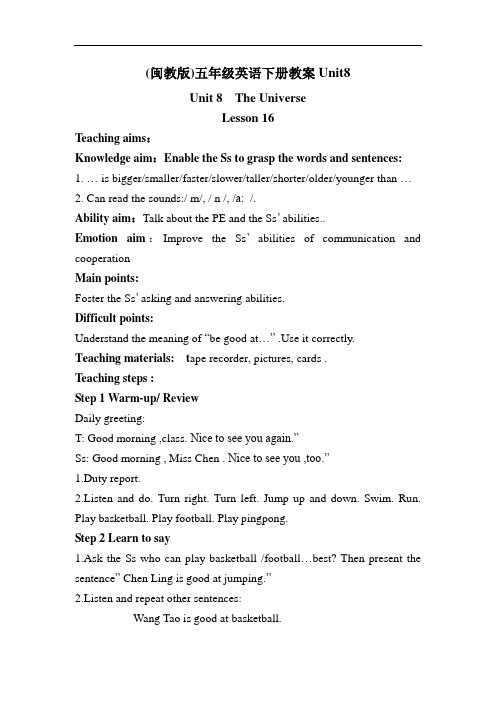
(闽教版)五年级英语下册教案Unit8Unit 8 The UniverseLesson 16Teaching aims:Knowledge aim:Enable the Ss to grasp the words and sentences:1. … is bigger/smaller/faster/slower/taller/shorter/older/younger than …2. Can read the sounds:/ m/, / n /, /а׃ /.Ability aim:Talk about the PE and the Ss’ abilities..Emotion aim:Improve the Ss’abilities of communication and cooperationMain points:Foster the Ss’ asking and answering abilities.Difficult points:Understand the meaning of “be good at…” .Use it correctly.Teaching materials: t ape recorder, pictures, cards .Teaching steps :Step 1 Warm-up/ ReviewDaily greeting:T: Good morning ,class. Nice to see you again.”Ss: Good morning , Miss Chen . Nice to see you ,too.”1.Duty report.2.Listen and do. Turn right. Turn left. Jump up and down. Swim. Run. Play basketball. Play football. Play pingpong.Step 2 Learn to say1.Ask the Ss who can play basketball /football…best? Then present the sentence” Chen Ling is good at jumping.”2.Listen and repeat other sentences:Wang Tao is good at basketball.These girls are good at pingpong.These boys are good at football.3.Listen and repeat, then practice in groups.Step 3.Ask and answer1.Let a student act, ask: Is he good at swimming? Help the Ss answer:Yes, he is/ No he isn’t.2. Ask and answerT: Is Sally good at jumpingSs: Yes, she is.T: Is she good at football?Ss: No ,she isn’t. But she’s good at pingpong.Step 4.Practice1.Listen and number.2.Groups work. Who is a sports boy/girl?3. Listen and learn the English sounds.Step 5 HomeworkListen to the tape & repeat for some times .Finish off the activity book of Lesson 16.。
厦门大学外文学院08—09学年团课党章学习策划书
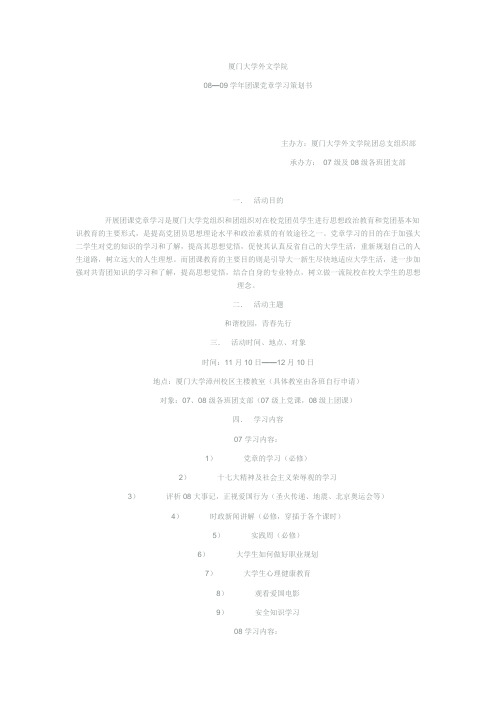
厦门大学外文学院08—09学年团课党章学习策划书主办方:厦门大学外文学院团总支组织部承办方:07级及08级各班团支部一.活动目的开展团课党章学习是厦门大学党组织和团组织对在校党团员学生进行思想政治教育和党团基本知识教育的主要形式,是提高党团员思想理论水平和政治素质的有效途径之一。
党章学习的目的在于加强大二学生对党的知识的学习和了解,提高其思想觉悟,促使其认真反省自己的大学生活,重新规划自己的人生道路,树立远大的人生理想。
而团课教育的主要目的则是引导大一新生尽快地适应大学生活,进一步加强对共青团知识的学习和了解,提高思想觉悟,结合自身的专业特点,树立做一流院校在校大学生的思想理念。
二.活动主题和谐校园,青春先行三.活动时间、地点、对象时间:11月10日——12月10日地点:厦门大学漳州校区主楼教室(具体教室由各班自行申请)对象:07、08级各班团支部(07级上党课,08级上团课)四.学习内容07学习内容:1)党章的学习(必修)2)十七大精神及社会主义荣辱观的学习3)评析08大事记,正视爱国行为(圣火传递、地震、北京奥运会等)4)时政新闻讲解(必修,穿插于各个课时)5)实践周(必修)6)大学生如何做好职业规划7)大学生心理健康教育8)观看爱国电影9)安全知识学习08学习内容:1)校史校规学习(必修)2)团章的学习(必修)3)十七大精神及社会主义荣辱观的学习(必修)4)时政新闻讲解(必修,可穿插于各个课时)5)实践周(必修)6)学习科学发展观和构建和谐社会7)观看爱国电影8)大学生心理健康教育9)安全知识学习注:各班团课党章学习的上课形式不限,各班可根据自己班级的特点采用各种新颖、活泼的形式。
五.活动流程(1)活动前期准备工作:1. 制作活动考勤及评比表(11月3日——11月6日)2. 申请外文学院组织部邮箱,以便收集各班党团课材料(xmuzuzhib@16)3. 申请外文学院组织部博客,把活动的策划等材料放上去,以便有疑问的班级更方便地了解活动情况()4. 召集各班团支书开会,布置党团课工作(5-6号)5. 通过海报宣传外文学院党团课正式开始(10号)(两张手绘海报分别贴于囊萤和凌云)6. 收集各班党团课策划以及具体上课地点(11月10日——11月11日)7. 安排各班的考勤人员(11月11日——11月13日)(2) 活动具体工作1.各班开展党团课2.组织部派人到各班上课地点考勤,并进行评分3.各班在上完每一次团课之后,负责发一份本次活动的总结和五张照片到组织部邮箱4.各班每两次团课后负责出一期海报,加大外院以及本班党团课的宣传,组织部负责收集海报张贴情况5.邀请宣传部成员负责帮我们随时跟踪报道党团课开展情况,通过网站加大我们党团课的宣传力度(3)活动后期工作1.各班负责交一份总的党团课总结(1500字以上),以及10张照片(冲洗出来)2.每位同学交一份总结(1000字以上)给团支书3.组织部负责考勤的人员对各班党团课开展情况进行总结(主要是课堂气氛、上课内容、形式和纪律等)4.活动后期宣传,结合优秀班级的照片制作一期海报(两份手绘)六.突发事件和安全考虑1. 各班教室如有生变动,由各班负责人与组织部干事联系2. 实践周期间各班要组织好本班同学,活动当天向组织部干事汇报活动进展及安全情况七.活动经费预算1. 海报(手绘)制作4张共计8元(每张以2元计算)2. 考勤表打印25份3.75元。
《大学英语三课件:Unit8》
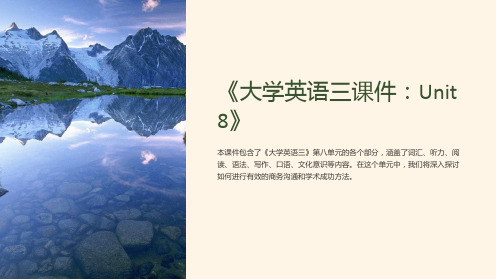
Dictionary Usage
Learn how to use a dictionary effectively to improve your language skills.
Contextual Learning
Discover techniques to learn new words and expressions in context.
Discover strategies to identify
main ideas and key details in
3
Practice Exercises
spoken texts.
Engage in interactive activities to
enhance your listening skills.
Speaking: Giving a Formal Presentation
Organization & Struesentation effectively for maximum impact.
Delivery Skills
Grammar: Future Perfect Tense
1 Form & Structure
Understand how to form and use the future perfect tense in English.
2 Time Expressions
Explore common time expressions used with the future perfect tense.
Listening Skills: Identifying Main Ideas
1
Pre-listening Strategies
学术英语(人文)Unit 8
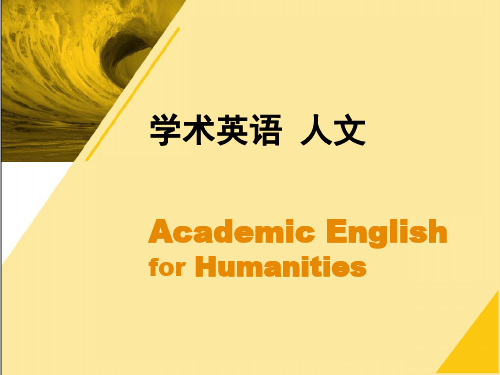
Unit 8 Understanding Philosophy
Text A
Supplementary information
What is Philosophy?
Work in pairs to compare your answers to the questions in Task 2 / Critical Reading and Thinking / Text A. P154
Unit 8 Understanding Philosophy
Text A
Supplementary information
What is Philosophy?
Work in pairs to compare your answers to the questions in Task 2 / Critical Reading and Thinking / Text A. P154
Suggested answer for Q3:
Conceptual analysis is arguably the most prominent method employed by philosophers. Its main purpose is to gain a better understanding of a particular philosophical issue involving a particular concept by breaking it down into smaller constituent parts. Many paradoxes or puzzles in philosophy stem from the imprecision of the concepts. When we come across a puzzling proposition, it might be helpful to analyze the concepts involved in the proposition in order to iron out
闽教版英语六年级上册 Unit 8 The Universe

Summary
单词:moon、 shine、its、 sun 、real
句子:Are there any……on the moon?
No,there aren't.
Is there a…… on the moon?
Are there any people on the moon? A:No,there aren't. B:Yes,there are.
Are there any people on the moon? No, there aren’t.
Are there any trees on the moon?
Unit 8 The Universe
Part A
the sun 太阳
the moon 月亮
the stars 星星
universe
Look at the moon.
It’s so bright.
Its light comes from the sun.
Look at the moon,Dad.
它的
its
it 、its、 it's的区别
it
它
its
它的
it's=it is 它是
sun
Its light comes from the sun.
This is the sun.
What are they talking about?
Are there any people on the moon? Are there any trees on the moon? Is there a rabbit on the moon?
从2017看2018厦门大学外文学院考研大纲

从2017看2018厦门大学外文学院考研大纲解析2018厦门大学的考研大纲还没公布,然而我们不能因为还没公布就放弃复习,那可咋办。
机智如我,当然是看2017年的考研大纲啦!每年的大纲其实变化并不是很大,大家可以根据大纲先进行复习,等到大纲正式公布后再进行调整。
2017年的考研大纲发布时间是8月26日,聚英厦大考研网提醒大家在8月份下旬要注意关注自己院校的考研大纲及大纲解析。
可以到聚英厦大考研网的大纲解析一栏去查看哦!一.2017年厦大外文学院研究生考试范围外文学院061英语语言文学系、062欧洲语言文学系、063外语教学部、064日语语言文学系、065法语语言文学系英语语言文学系和外语教学部:708写作与英汉互译:考察学生的英语写作能力(内容详实、表达流畅,无明显语法用词错误)、英译汉与汉译英的基本功。
814阅读及英美文学、语言学基础:考察学生的英语阅读能力、考察学生的英美文学和语言学方面的常识积累。
二、2017年厦大外文学院研究生初试考试科目厦大各院系招生目录(含初试考试科目):/Item-8179.aspx进去后寻找外文学院就可以看到了!三、厦大考研大纲汇总厦门大学专业课和公共课考研大纲汇总:/Default-594.aspx四、推荐厦门大学外文学院考研复习资料:/xmu/all-164其他院系资料也可以进入上面的页面选择自己想报考的院系了解。
厦门大学历年真题:/Default-39.aspx聚英厦大考研网为了方便大家进行交流学习,我们为大家创建了厦大外文学院考研群:572219258。
群里提供免费咨询,上传各种考研资料并会及时更新考研资讯,不定时举办考研讲座等活动帮助大家更好地学习,对大家的考研应该会有帮助,欢迎大家加入哦!。
厦门大学海外教育学院项目介绍Brief introduction to Chinese
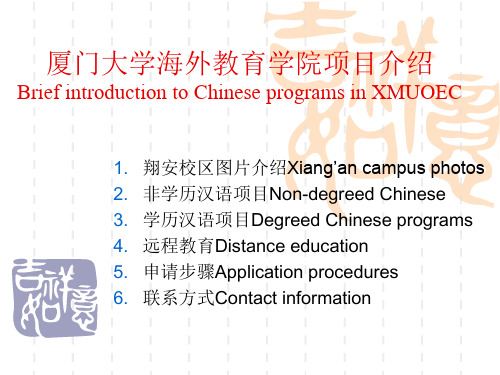
长期汉语 Long term Chinese
长期汉语进修 Long term Chinese
学历汉语项目 Degreed Chinese programs
项目 Programs ①经贸汉语方向 Business Chinese ②中国文化方向 Chinese culture ③对外汉语教学方向 Teaching Chinese as a foreign language (TCFL) ①对外汉语教学硕士 TCFL (3 yrs) ②语言学和应用语言学硕 士Linguistics & Applied Linguistics (3 yrs) ③汉语国际教育硕士 Master of Teaching Chinese to Speakers of Other Languages (MTCSOL, 2 yrs) 对外汉语教学博士 TCFL 时间和费用 periods & fees 二到四年 秋季学期入学 4 yrs or 2+2 yrs Beginning in autumn semester 18,000RMB/year (3rd & 4th year) 入学要求 requirements 高中毕业或同等学力,已通过 HSK五级的学生可插班三年 级 High school graduates or above; New HSK 5 or above (to 3rd yr.)
申请步骤 Application procedures
1. 注册账号:访问厦门大学海外教育学院主页,点击右上方的“Login”进入登录界面,然后点 击“New account”,以你常用的电子邮件地址作为用户名注册新账号。 New Account: OEC web – Login – New account (email as username) 2. 选择类别:登录系统后,选择你准备参加的学习项目类别(新账号登录后只有一次选择机会, 请根据自身条件和要求认真选择)。 Program Type: Login and choose the type of program planning to take. Please make your choice carefully, for there is only one chance for each account. 3. 信息填写:依次完成“个人信息-联系方式-专业选择”等栏目的信息填写,并在“文件上传” 上传入学要求的护照、照片和证书等材料。 Completing Information: Fill in all blanks in columns of personal information, contact information & program options and upload the required documents like passport, photos & certificates. 4. 提交申请:进行上述操作后,可以提交申请。如提交失败,系统会告知哪个具体步骤未完成。 Submitting Application: You can submit your application after the above steps. The system will tell which step needing to be completed if it fails. 5. 状态查询:进行上述操作后,基本已经完成申请。你可以在“申请状态”里面看到各个申请 步骤的完成情况和学校的录取进展。 Application Status: Application is completed after the above steps. You can see the status of your application and the progress of OEC admission in the column of application status.
师大选择性必修Unit8 Writing Workshop 公开课课件

Read for writing
3. What did Ned think would happen to them? They would die.
4. How is the continuation connected with the original story? It uses the same characters as the original story, and it tells what happens next.
Compose your writing
Ⅳ Compose your writing
Compose your writing
Writing Help
Writing a Continuation of a Story It’s important to: • understand the setting, the characters and the plot of the original
UNIT 8 LITERATURE
WRITING WORKSHOP A CONTINUATION OF A STORY
目 录 页
contents
I Get ready for writing II Read for writing III Structure and language
IV Compose your writing
I Get ready for writing
Pair work You are going to write a continuation of the story “The Last Leaf”. Discuss the questions with your partner.
- 1、下载文档前请自行甄别文档内容的完整性,平台不提供额外的编辑、内容补充、找答案等附加服务。
- 2、"仅部分预览"的文档,不可在线预览部分如存在完整性等问题,可反馈申请退款(可完整预览的文档不适用该条件!)。
- 3、如文档侵犯您的权益,请联系客服反馈,我们会尽快为您处理(人工客服工作时间:9:00-18:30)。
custody : the right to take care of a child, given to one of their parents when they have divorced • It is usually the mother who is awarded custody. • Allen is fighting a bitter custody battle over his three children.
Unit 8
Sex Roles
Man for the field and woman for the hearth; Man for the sword and the needle she; Man with the head and woman with the heart; Man to command and woman to obey; All else confusion. — ALFRED, LORD TENNYSON • Many, if not all, of the personality traits which we have called masculine or femi-nine are as lightly linked to sex as are the clothing, the manners, and the form of headdress that a society at any given period assigns to either sex. — MARGARET MEAD • How is it that this world has always belonged to the men? -- SIMONE DE BEAUVOIR
Which is the topic sentence of the paragraph?
• Sex roles, then, are part of our concept of ourselves, our gender identity.
P3
• Sex roles are of great interest to psychologists, sociologists, and other social scientists. Psychologists focus primarily on “inner” personality traits and stereotypes associated with femininity and masculinity, while sociologists emphasize patterns of “outer” behavior or interaction in society. For example, a sociologist studying the paid labor force of the United States would note that most truck drivers are male while most nurses are female. Family sociologists have studied the inclination of judges in child custody cases to assume that mothers are innately better at parenting than fathers.
P2
• Sex roles are based on social norms the agreedupon standards of acceptable behavior within a society. These norms — such as the norms that men should keep their feelings under control and women should be passive — influence our judgments not only of others but also of ourselves. Thus, if you are male and prone to tears during highly emotional moments or female and likely to dominate classroom discussions and arguments, you may judge yourself harshly because you have internalized traditional sex-role assumptions. Sex roles, then, are part of our concept of ourselves, our gender identity.
prone: having a tendency; inclined
• be prone to: be likely to; be liable to (esp. sth. bad or harmful) • “To err is human” means everyone is prone to make mistakes. • Although they are always at the center of things, they tend to be loners and are prone to stress when life becomes difficult.
stereotype : a belief or idea of what a particular type of person or things is like (often unfair or untrue) • Regional stereotypes have been part of America since its founding: Westerners are trendy, Mid-westerners are dull, Northeasterners are brainy, and Southerners are lazy. • When I saw the big smiles in the faces of the German students, the stereotype of Germans (rigid, somewhat humorless and obsessed with order and formality) melted.
harshly: severely, cruelly, or unkindly
• His theory was criticized harshly by his colleagues. • History is apt to judge harshly those who sacrifice tomorrow for today.
Questions
• What do you think is the proper male or female relation? • What do you know about feminist view about male-female relation in this world?
P1
What does the ቤተ መጻሕፍቲ ባይዱaragraph do?
• A role in a play is a part for an actor; it includes certain scripted actions, ways of walking, talking, expressing feelings, and so forth. • A sex role is a part that an individual plays as a social actor — the patterns of feeling and behavior deemed appropriate or inappropriate because of her or his gender. • The “script” comes from social expectations about masculine and feminine nature: men should be brave, strong, ambitious, and aggressive, while keeping their feelings under control: women should be gentle, nurturant, passive, dependent, and expressive of their feelings. • It defines a sex role.
inclination: a preference or tendency; a feeling that makes a person want to do sth • You always follow your own inclinations instead of considering other people’s feelings. I have no inclination to follow my mother into accountancy
norm : n. 标准 规范 标准,规范
• Criminal behavior seem to be the norm in this neighborhood. 犯罪行为似乎是这一带的正常现象。 • Holding the view that the ego is the center, object, and norm of all experience. 自我中心的认为自我是所有的中心、对象和经验 的标准的 • Synonyms: standard norm criterion
deem: think of sth. in a particular way; consider
